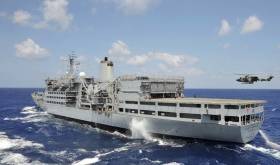Displaying items by tag: Royal Fleet Auxiliary
Large Royal Navy Supply Ship Sails in for Volvo Cork Week
#LargeUKvisitor - One of the largest UK naval vessels is at time of writing arriving into Cork Harbour this morning to coincide with Royal Cork Yacht Club’s Volvo Week, writes Jehan Ashmore.
The visit of RFA Fort Rosalie is also in the same year of the 70th anniversary of the foundation of the Irish Naval Service in 1946.
RFA Fort Rosalie (A385) is one of a pair of Fort Class Solid Support Tanker replenishment vessels of the Royal Fleet Auxiliary. She along with RFA Fort Austin and the overall RFA fleet also supply food, stores and ammunition to the Royal Navy fleet, whilst underway.
Also this morning, Naval Service CPV L.É. Orla, formerly HMS Swift of the Royal Navy Hong Kong Maritime Squadron met the 185m long auxiliary vessel off the entrance to Cork Harbour.
The RFA Fort Rosalie drawing 8m draft, had sailed from the French Naval Base at Brest, is to berth at Cobh’s deepwater quay.
Opposite of Cobh is Haulbowline Island where the Irish Naval Service Base is located and where the last major commemoration event, the 50th anniversary of the navy was held this month 20 years ago. On that occasion in July 1996 several foreign navies including the Royal Navy's HMS Manchester attended the 'Jubilee' event. The highlight I recall was the Fleet Review in Cork Harbour led by flagship L.É. Eithne.
The London registered 23,384 tonnes displacement RFA Fort Rosalie earlier this year at Portsmouth Naval Base assisted harbour tugs. This concerned an opportunity to put in some practice of towing large vessels ahead of the arrival next year of the 65,000 displacement tonnes HMS Queen Elizabeth.
One of the Aircraft Carrier Alliance contractors is Babcock International which to date has built the Naval Service OPV90 trio in which newbuild LE James Joyce is expected to be delivered next month.
As for the first of a pair of ‘QE’ new aircraft carriers under construction in Scotland, HMS Queen Elizabeth is to replace HMS Illustrious (see final Dublin call previously reported on Afloat.ie) Also see report on retirement as this year the UK's MOD announced that she is to be scrapped following the fate of her two ‘Invincible’ class sisters.
RFA Fort Rosalie is nearly 100m shorter and nearly three times lighter than the new carrier and sister HMS Prince of Wales. The Fort class auxiliary tanker-supplier ship is still considerably larger than any warship currently based in Portsmouth.
On the approaches to Portsmouth off the Nab Tower, some ten miles to the entrance to the port RFA Fort Rosalie was met by privately operated tugs from Serco, the Bountiful, Indulgent and Independent. The role of tugs had previously been part of RFA operations.
RFA Fort Rosalie built in 1978 and RFA Fort Austin each has a range of 10,000 miles at 20 knots, though the top speed can be 22 knots.
The Fort class have extensive aviation facilities, with 2 flight decks, one at the stern and one spot on top of the hanger. They have the ability to replenish at sea via 6 replenishment stations, three on each side as well as using helicopters for vertical replenishment (VERTREP).
Among defences, the pair have the Phalanx system, one of the deadly last lines of defence for the UK navy. Capable of engaging targets around one mile away, it is a radar-controlled Gatling gun which fires 20mm shells, that spews out 3,000 rounds a minute.
This is designed to engage incoming enemy aircraft and missiles if they penetrated a ship or task group's outer ring of defences such as Sea Viper or Sea Dart.
Newbuilds: Incoming 'Tide' Class for UK’s Naval Auxiliary Service
#RFAnewtankers – The Royal Fleet Auxiliary (see tanker visit to Dublin Port) have ordered a new class of replenishment tanker following a steel-cutting ceremony at Daewoo Shipbuilding and Mechanical Engineering's (DSME) Opko shipyard in South Korea.
DSME will build four of the British-designed 'Tide' class which will replace vessels including the 'Rover' class RFA Gold Rover (A271). The replacement programme is part of the UK MoD's Military Afloat Reach and Sustainability (MARS) Fleet Tanker programme. For more on this story, Ships Monthly has a report.
RFA Gold Rover's visit late last month to Dublin Port was unusual given she is a member of the Royal Fleet Auxiliary, which supports Royal Naval vessels at sea by replenishing fuel, supplies and stores.
Royal Fleet Auxiliary Replenishment Tanker On Five-Day Courtesy Call
#RFAtanker – A UK tanker of the Royal Fleet Auxiliary, RFA Gold Rover (A271) that has a supporting role in the Royal Naval, arrived into a foggy Dublin Bay to dock in the capital for a five-day courtesy visit, writes Jehan Ashmore.
The visit of RFA Gold Rover of 11,522 tonnes displacement coincides on this UK August Bank Holiday Monday and notably she is a rare visitor to an Irish port given that she is a member of the Royal Fleet Auxiliary.
Her visit follows another important large British naval caller when the Royal Navy's HMS Illustrious (R06) as previously reported on Afloat.ie called to the capital in April 2013. This was to be the final visit to Dublin of the former air-craft carrier which during her call was scaled down to helicopter duties. She is to be decommissioned later this month.
The 140m (461ft) long RFA Gold Rover sailed from Loch Striven Oil Fuel Depot on the Scottish west coast and understood to be under the command of Commanding Officer Shaun Jones. The crew is made up of 16 officers and 31 ratings, totalling 60 crew members.
On arrival in Dublin Bay, RFA Gold Rover took a pilot from the cutter, Camac. When within the port’s channel fairway she was greeted by the ports pair of tugs, Beaufort and Shackleton which escorted her to the Deepwater Quay Berth or ‘Coal’ Quay along the south quays.
RFA Gold Rover is the longest serving 'Rover' class remaining in RFA service since her commissioning in 1974. In that first year, she participated in evacuation duties during the partition of Cyprus when Turkey invaded the island.
The 'Rover' class represent one of the most successful tankers designed by the UK Admiralty. They were all built by Swan Hunter Shipyard of Tyne and Wear. The primary roles are to replenish Royal Naval ships at sea with fuel, oil aviation fuel, fresh water in addition to supplying dry-cargo and refrigerated stores.
RFA Gold Rover's most recent major deployment was in the South Atlantic which saw her maintain warships kept on station at sea for a two-year timeframe which was completed in 2013.
During those two years, she totalled 91,860 nautical miles since leaving Portland, Dorset and her ports of call included Gran Canarias, Ascension, St Helena and South Africa. This saw her crew rack up 7,789 man-hours on watch while refuelling and restoring RN ships on patrol duties, with food, equipment, spares, medical supplies, water and other stocks.
In April of this year, the 40 year old tanker underwent a refit at Cammell Laird Shipbuilders and Repairers in Birkenhead, though as the eldest of the fleet, her days are numbered. The ageing 'Rover' and 'Leaf' class single-hulled tankers are to be replaced by new 'Tide' class newbuilds on order from a shipyard in the Far East.



























































